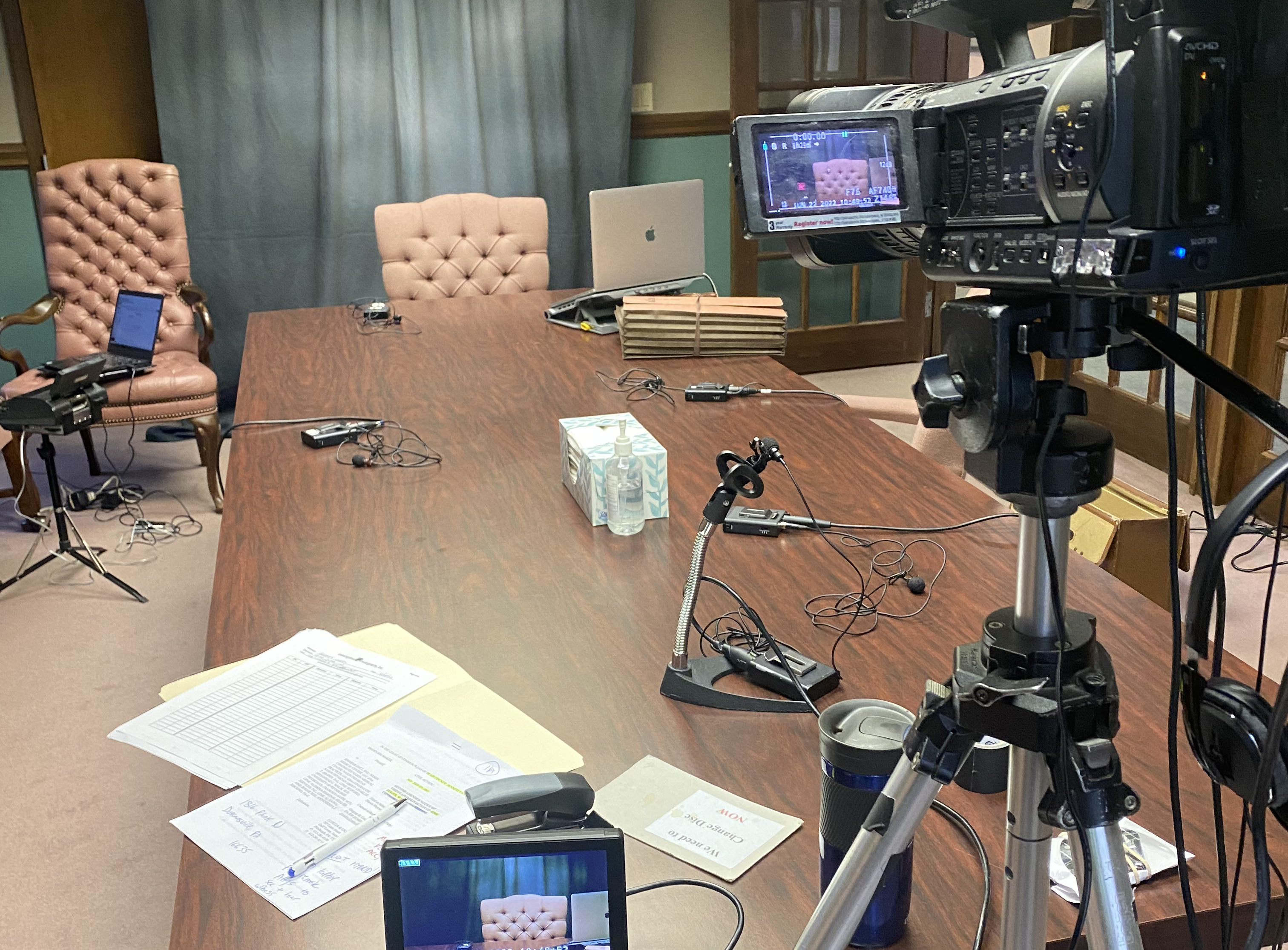What clients need to know before their legal video depositions session
The Value of Lawful Video Depositions in Modern Legal Solutions: What You Should Know
Lawful video clip depositions have ended up being necessary in today's legal landscape. They offer a multidimensional view of witness testimonies that conventional transcripts simply can not match. By catching both non-verbal and spoken interaction, these depositions improve the general understanding of a witness's trustworthiness. The effectiveness of video clip depositions pivots on different factors, consisting of compliance with legal standards and finest practices. Checking out these aspects reveals their real significance in modern lawful solutions
What Are Lawful Video Clip Depositions?
Lawful video depositions work as an essential device in the lawsuits process. They include taping witness testaments in a video clip style, recording both verbal and non-verbal interaction. This technique allows lawyers to record the disposition, expressions, and reactions of witnesses, providing a richer context for the testament. Typically performed in a controlled setting, these depositions are led by attorneys who ask inquiries while a stenotype reporter records the dialogue. The resulting video can be essential for trial prep work, as it allows legal representatives to evaluate the credibility of witnesses and fine-tune their approaches. Furthermore, lawful video depositions can be used in different legal contexts, varying from civil disagreements to criminal situations. The auditory and visual aspects of video depositions improve the discussion of evidence, making it a crucial element in the contemporary legal landscape. Generally, they add substantially to the effectiveness and performance of legal process.

Benefits of Video Clip Depositions Over Conventional Techniques
Video depositions use numerous advantages contrasted to conventional methods of taking witness testimonies. One substantial advantage is the ability to capture both audio and visual elements, supplying an extra comprehensive document of the witness's statements. This twin format improves clarity and enables lawyers to reference particular nuances throughout test prep work. In addition, video clip depositions facilitate remote participation, making it easier for witnesses that might be unavailable for in-person appearances because of geographical restraints or health issues.Moreover, video clip depositions can expedite the total deposition process, reducing the time and prices related to traveling and logistics. They additionally enhance access, as recorded depositions can be easily shared among legal groups and referenced at any moment. This benefit adds to better case monitoring and prep work. In general, video clip depositions stand for a modern, effective technique to gathering witness testimonies, lining up with the advancing requirements of the lawful occupation.
The Function of Body Movement and Tone in Testimonies

In legal video depositions, body movement and tone play essential roles in sharing a witness's reputation and dependability. Nonverbal cues can provide understandings into a witness's psychological state, affecting exactly how their testament is regarded. Understanding the influence of these elements is necessary for lawyers and jurors alike when assessing the reliability of a testimony.
Nonverbal Communication Insights
While spoken communication is often stressed in lawful statements, nonverbal cues such as body movement and tone play a necessary function in sharing integrity and emotion. Onlookers of depositions might keep in mind that a witness's stance, gestures, and faces can significantly affect assumptions of reliability. As an example, regular eye get in touch with may signify confidence, while staying clear of look can suggest dishonesty or pain. In a similar way, the intonation-- its pitch, volume, and speed-- can give feelings of genuineness or unpredictability. Lawyers should be in harmony with these nonverbal signals, as they usually offer critical context that enhances talked words. Comprehending these nuances can enhance the efficiency of depositions and influence the outcome of lawful procedures.
Emotional Tone Effect
The emotional tone shared throughout lawful testaments greatly influences exactly how a witness is regarded. Body movement, vocal inflections, and faces play essential functions in shaping the story of a testament. A witness exhibiting confidence via constant eye contact and a calm tone can instill a feeling of dependability and involvement. Conversely, indicators of stress and anxiety, such as fidgeting or an unsteady voice, might result in suspicion concerning their account. The nuances of psychological expression can affect the analysis of facts, making it vital for lawful experts to recognize these hints. In video clip depositions, the visual and acoustic elements integrate, stressing the relevance of psychological tone in sharing sincerity and truthfulness within the lawful process.
Integrity and Trustworthiness
An essential consider developing credibility and reliability during testimonies hinges on the witness's body movement and tone of voice. Onlookers frequently rely upon non-verbal cues-- such as eye call, pose, and motions-- to evaluate a witness's sincerity. A witness who preserves eye call and shows open body language may be perceived as more reputable and straightforward than one who avoids eye contact or shows up shut off. In addition, intonation plays an essential duty; a constant, tranquil tone can strengthen the integrity of the statement, while changes in pitch or quantity might elevate doubts. Ultimately, the mix of body language and vocal tone significantly influences just how a witness's declarations are obtained and translated in a legal context.
Best Practices for Carrying Out Video Depositions
Performing video depositions needs cautious preparation and execution to assure a clear and reliable discussion of testament. Initially, it is essential to choose a silent, well-lit area to decrease diversions and safe and secure ideal video high quality. The equipment needs to be examined beforehand, consisting of cams, microphones, and illumination, to avoid technological problems throughout the deposition.Next, parties included must assess the layout and treatments beforehand, making certain that everyone recognizes their functions. The deponent should be briefed on the procedure, including just how to respond clearly and concisely.Additionally, maintaining a specialist behavior throughout the session is important. This includes refraining from speaking over each other and validating that all inquiries are routed appropriately. It is critical to videotape the deposition in a style that allows for simple playback and testimonial, protecting the integrity of the testimony for future use.
Legal Considerations and Conformity Issues
Just how do lawful considerations and conformity problems impact the efficiency of video clip depositions? Lawful professionals must browse a complicated landscape of laws, making sure that video address depositions abide by jurisdictional policies and standards. Compliance with laws worrying personal privacy, approval, and recording approaches is necessary. For circumstances, obtaining specific approval from all celebrations included is required to stay clear of lawful repercussions.Additionally, the admissibility of video proof in court can rest on compliance with step-by-step needs. Guaranteeing that the equipment made use of satisfies technological criteria is additionally vital, as bad top quality can threaten the deposition's reliability.Moreover, lawyers have to understand any kind of particular state legislations that regulate video depositions, as these can differ greatly. Failing to deal with these considerations can not only endanger the integrity of the deposition however also impact the total case technique, inevitably affecting the customer's lawful outcomes.
Exactly How Video Depositions Impact Court Assumption
While video depositions can serve as powerful tools in legal proceedings, their influence on court assumption is considerable. The aesthetic and auditory components of video clip recordings provide jurors with an extra thorough understanding of witness disposition, reliability, and emotional actions. This multimedia method can enhance the jurors' capacity to examine the reliability of statement compared to traditional text-based transcripts.Moreover, video depositions enable jurors to observe body movement, tone of voice, and faces, every one of which can affect their interpretation of the witness's declarations. The presence of a witness on display can humanize them, fostering compassion and connection, which might guide jurors' opinions. Conversely, a witness who appears incredibly elusive or unreliable on video clip might lead to adverse understandings that affect a jury's choice. Inevitably, the dynamic nature of video depositions plays a crucial role in forming exactly how jurors translate proof and reach their judgments.
The Future of Video Clip Depositions in Legal Technique
As improvements in technology proceed to reshape the legal landscape, the future of video clip depositions is poised for considerable advancement. Advancements such as expert system, digital fact, and boosted video clip conferencing devices are anticipated to simplify the deposition procedure and enhance access. Attorneys might make use of AI-driven analytics to analyze witness credibility and instance strength much more effectively.Moreover, the combination of virtual reality can enable juries to experience immersive simulations of depositions, supplying much deeper context and understanding. Additionally, the fad toward remote depositions is most likely to continue, supplying better flexibility for lawyers and customers alike.As remote work comes to be increasingly stabilized, video clip depositions will likely come to be conventional technique, lowering expenses and time restraints connected with traditional techniques. Generally, these technical innovations guarantee to improve the performance, efficiency, and accessibility of video clip depositions in lawful technique, eventually transforming just how lawyers get ready for test.
Frequently Asked Inquiries
Just How Much Do Lawful Video Clip Depositions Typically Cost?

Can Video Clip Depositions Be Made Use Of in Any Sort Of Situation?
Video clip depositions can be made use of in numerous sorts of situations, consisting of civil, criminal, and family members legislation. Their adaptability enables lawyers to existing witness testimonies successfully, adjusting to the certain needs of various legal situations.
What Devices Is Needed for a Video Deposition?
To perform a video deposition, essential tools includes a top quality camera, microphone, illumination, and a trustworthy recording tool. Additionally, a computer with editing and enhancing software application might be needed for post-production and formatting the last video clip.
Just how Long Does a Common Video Deposition Last?
A normal video clip deposition lasts between two to 4 hours, depending on the intricacy of the instance and the number of questions posed. Prolonged sessions may happen, yet breaks are generally included for individual convenience.

Are Video Clip Depositions Admissible in Court?
Video clip depositions are generally acceptable in court, offered they stick to lawful criteria and policies of proof. Their use boosts quality and maintains witness testament, assisting in the judicial procedure throughout hearings and tests. Legal video depositions have actually come to be vital in today's legal landscape. Furthermore, lawful video depositions can be made use of in various lawful contexts, ranging from civil disagreements to criminal situations. Furthermore, video depositions help with remote participation, making it less complicated for witnesses that might be unavailable for in-person looks due to geographical restraints or wellness issues.Moreover, video clip depositions can accelerate the total deposition procedure, minimizing the time and expenses check it out connected with travel and logistics. Making certain that the devices made use of meets technological requirements is likewise important, as poor high quality can weaken the deposition's reliability.Moreover, attorneys have to be mindful of any type of details state regulations that regulate video clip depositions, as these can differ considerably. Furthermore, the pattern towards remote depositions is likely to persist, offering greater versatility for clients and lawyers alike.As remote work ends up being significantly normalized, video depositions will likely come to be typical method, lowering prices and time constraints linked with traditional approaches.